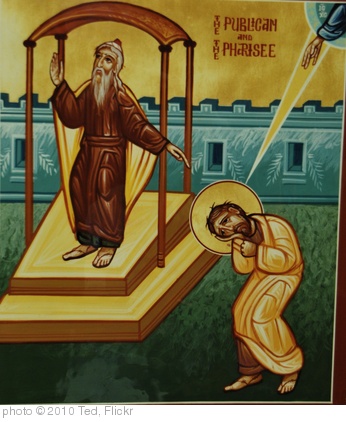Sometimes scriptural texts cannot be understood on even the most basic level without taking into account the contexts in which they are situated. Yet sometimes they speak plainly, and require no explanation at all. To me, this week’s readings stand as examples of the latter. They speak so plainly, in fact, that it seems that trying to add to them or “break them down” would only obscure their meaning. So more than anything, I would just advise people to read the text themselves, and if that means navigating away from this post, well, so be it.
The first reading from the book of Sirach opens with this direct statement: “the Lord is a God of justice, who knows no favorites.” The Lord is just and so will act to bring about justice, which means that “he hears the cry of the oppressed.” The reading goes on to flesh out this main point in only slightly more literary language:
The Lord is not deaf to the wail of the orphan,
nor to the widow when she pours out her complaint.
The one who serves God willingly is heard;
his petition reaches the heavens.
The prayer of the lowly pierces the clouds;
it does not rest till it reaches its goal,
nor will it withdraw till the Most High responds,
judges justly and affirms the right,
and the Lord will not delay.
There are times, it seems, when the Scriptures simply mean what they say, and do not invite hermeneutical analysis or social contextualization, as necessary as these often are. At the risk of sounding unreflective or glib, I might dare to say that Christians should simply read this passage and take its prima facie meaning to heart: God hears the poor and will respond to their prayers.
In Isaiah 55, we find a prophetic passage that seems to mirror the one from Sirach:
For as the rain and the snow come down from heaven,
and do not return there until they have watered the earth,
making it bring forth and sprout,
giving seed to the sower and bread to the eater,
so shall my word be that goes out from my mouth;
it shall not return to me empty,
but it shall accomplish that which I purpose,
and succeed in the thing for which I sent it.
Both passages describe their subject—the prayer of the lowly and the word of God—in terms taken from the natural patterns of the heavens. The dynamic that governs them is an immutable and irresistible force. While it is not surprising to think about God’s word like that, I would venture to say it is less common to think of the prayers of the oppressed in that way.
We often may think of God as “preferring” the cry of the poor to others, almost as if their prayers were marked upon departure with stickers labeled “urgent” or “expedited.” Yet if we take this first reading on face value, it might be better to think of God’s preference along the lines of a scientific law—“spiritual physics” as Fr. Robert Barron might say. In other words, if we know anything about God and how God works, we know this and must take it as axiomatic: God hears the cry of the poor and responds to it.
It is fitting, then, that that theological axiom is duly pounded into our heads in this week’s psalm response: “The Lord hears the cry of the poor.” At the same time, it is worth noting who else the psalm says is heard by the Lord: the just, the brokenhearted, the crushed and his servants. Taken within the same immediate context, it is not unreasonable to regard these groups as interchangeable. To be just is to be brokenhearted, and to serve the Lord is to be crushed. If we consider these descriptions to be in some sense transitive, then it is clear that the psalm is not merely a consoling rallying cry for the poor, shouted from the bleachers, but rather a call to complete solidarity with those whom the Lord favors. We should therefore question our own justice if it leaves our hearts fully intact.
The portrait given by the Lord himself in the gospel confirms this relationship between justice and sorrow:
Two people went up to the temple area to pray;
one was a Pharisee and the other was a tax collector.
The Pharisee took up his position and spoke this prayer to himself,
‘O God, I thank you that I am not like the rest of humanity—
greedy, dishonest, adulterous— or even like this tax collector.
I fast twice a week, and I pay tithes on my whole income.’
But the tax collector stood off at a distance
and would not even raise his eyes to heaven
but beat his breast and prayed,
‘O God, be merciful to me a sinner.’
I tell you, the latter went home justified, not the former;
Perhaps the most telling phrase of the parable is the description of what the Pharisee is actually doing: he “spoke this prayer to himself.” It is a dangerous question for any Christian to ask how much of their prayer they recite in this way, to themselves. Yet it is a matter that lies at the heart of the spiritual life: how much of my adoration, petition, reparation and gratitude is really directed to myself instead of God? There is no more purely relational prayer than the one uttered in a state of true need: “help me!”
Again, the text here states its meaning plainly: “whoever exalts himself will be humbled, and the one who humbles himself will be exalted.” Yet what does it mean to be humbled, to be exalted?” The Pharisee is ripe for humiliation, yes, but not so much in the way superhero villains are, but rather in the much scarier and more pitiable way that the arrogant isolate themselves from others and end up lonely and sad. What could be more sad, after all, than someone praying to themself? Likewise, the sort of exaltation in store for the tax-collector is not of the sort in the back of the Pharisee’s mind—the positive acclaim of worldly glory—but rather the more satisfying and truly glorious exaltation of being one who is in conversation with God, heard and addressed by the Lord of all. And as God’s word tells us so clearly this week, the surest way to enter and remain in this conversation is to enter and remain in full solidarity with the poor.




Perhaps the words “require no explanation at all” for you, but they sure do for me. “God hears the cry of the poor and responds to it.” The words are clear, but unless they are “explained” they sure don’t seem “honest” to me. The plight of the poor in this country and the world just seems to get worse and worse. The poor are pleading for relief. “Help me!” Where is it. So someone needs to explain how we see that.
It’s too easy just to say, “God answers in his/her own way.” Perhaps that is true, but how is that different than for anyone else.
“The poor are pleading for relief. “Help me!” Where is it. So someone needs to explain how we see that.” Help comes from us. We are then hands, the eyes, the ears, the feet of God on earth. We are the ones called to bring about The Kingdom That Is, Here and Now. the fact that you ask the question is almost an answer in itself. We, not God, have failed in what we are called to do. We have failed to climb out of our comfey pews and safe academic hideaways to get out in the world. To shake things up as Pope Francis says.
I did not mean to trivialize the plight of the poor by any means, but only to accentuate the axiomatic character of the Biblical claim that those who suffer injustice will be vindicated in the end. Exactly what that looks like is not entirely clear from our vantage point, but we do know that the material and spiritual aid we offer the poor here and now is a step toward that final destination. In working to right injustices here and now, we do not so much “play the part of God” as willingly participate in the eternal moral “current” of God’s very being. Creation, though fallen, can not ultimately escape that current. The Bible never leaves open for question whether God will ultimately judge the world; the real question is on which side of His justice we will find ourselves when he does. It can certainly be hard from our limited perspective to believe that God will ultimately vindicate every injustice, but my point is that that very promise is plainly and repeatedly given in Scripture. We may try to nuance it to console ourselves if we feel we may have any part in the oppression of the poor, but the text itself resists our theologically sophisticated attempts to exonerate ourselves. And I would certainly implicate myself in that accusation as well. As almost every homilist will tell you, we preach to ourselves first and foremost…